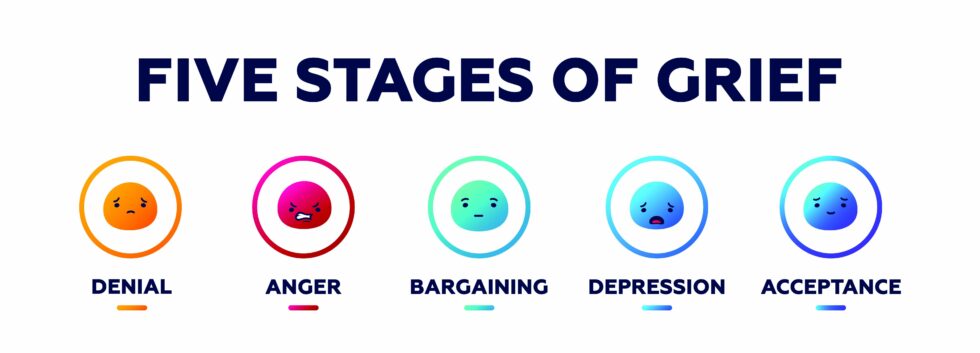
By Kirk Reber
Grieving is a natural response to loss, and it’s something we all experience at various points in our lives. Whether it’s the loss of a loved one, a change in health, or other significant life events, grief can feel overwhelming. For some, these experiences can be especially poignant as they may coincide with retirement, the loss of peers, or shifting roles within the family. Understanding the stages of grief can help in navigating these complex emotions while maintaining an awareness of personal mental health and wellbeing.
The stages of grief, as identified by Elisabeth Kübler-Ross, are denial, anger, bargaining, depression, and acceptance. It’s important to remember that these stages are not linear; they can come and go, and not everyone will experience all of them.
Denial is often the first response to loss. It acts as a buffer, helping us to cope with the initial shock. Denial might look like insisting that everything is fine or avoiding conversations about the loss. For instance, after losing a close friend, one might avoid going to places they frequented together, feeling that acknowledging the absence makes it too real. While denial can provide a temporary emotional break, persistent denial can lead to anxiety disorders, as the avoidance of reality prevents proper emotional processing.
Anger can arise when the reality of the loss sets in. It’s a natural reaction to the feeling of helplessness that often accompanies grief. Many people might feel anger toward doctors, family members, or even themselves, wondering why the loss occurred or if it could have been prevented. For example, someone might feel frustration toward a healthcare provider for not being able to prevent a spouse’s illness, or even anger at themselves for not identifying symptoms earlier. This stage can sometimes be associated with heightened irritability or even depressive symptoms, as the intensity of anger can mask deeper feelings of sadness.
Bargaining is characterized by thoughts of “if only” and “what if.” This stage often involves negotiating with oneself or with God, wishing for things to be different. Seniors might find themselves reminiscing and wishing they had done things differently, such as spending more time with a loved one. Bargaining reflects the desire to regain control in a situation that feels uncontrollable, and it’s a stage that can sometimes be linked with feelings of guilt and regret, also contributing to generalized feelings of anxiety.
Depression in grief is not just sadness; it can include a deep sense of emptiness and withdrawal from regular activities. For older adults, this stage might involve losing interest in hobbies, neglecting self-care, or feeling as though there is no point in continuing usual routines. This stage can be particularly challenging as it may intertwine with other life circumstances, such as health issues or social isolation. Prolonged depression can develop into clinical depression, especially if the individual does not seek support or if it exacerbates existing mood disorders like mild or major depression.
Acceptance is not about being “okay” with the loss; rather, it’s about acknowledging the hurtful reality and being intentional in discovering ways to heal. Acceptance might look like finding new routines, seeking joy in small things, or sharing memories of the loved one without overwhelming sadness. Acceptance can bring a sense of peace, allowing one to reflect on the past with fondness while still finding purpose in the present. However, if acceptance is forced or if someone feels pressured to “move on” too quickly, it can lead to feelings of unresolved grief, where lingering sadness or a sense of incompleteness persists.
Grief is personal, and there is no right or wrong way to experience it. It’s crucial to give yourself the time and space to process emotions at your own pace. Maintaining connections with others, seeking support from grief counseling, pastoral counseling, or support groups, and engaging in activities that bring comfort can all contribute to emotional healing.
Remember, it’s okay to ask for help and to express your feelings, whether they are of sadness, anger, or even moments of joy as you remember what was lost. Psalm 34:18 (NIV), which says, “The Lord is close to the brokenhearted and saves those who are crushed in spirit,” reminds us of God’s presence and comfort during these times of sorrow and loss.
You are not alone. Grief, though challenging, can also be a journey of personal growth and transformation.
Kirk Reber is the executive director of Cross Connections Counseling Ministry in Fort Wayne, Ind.


